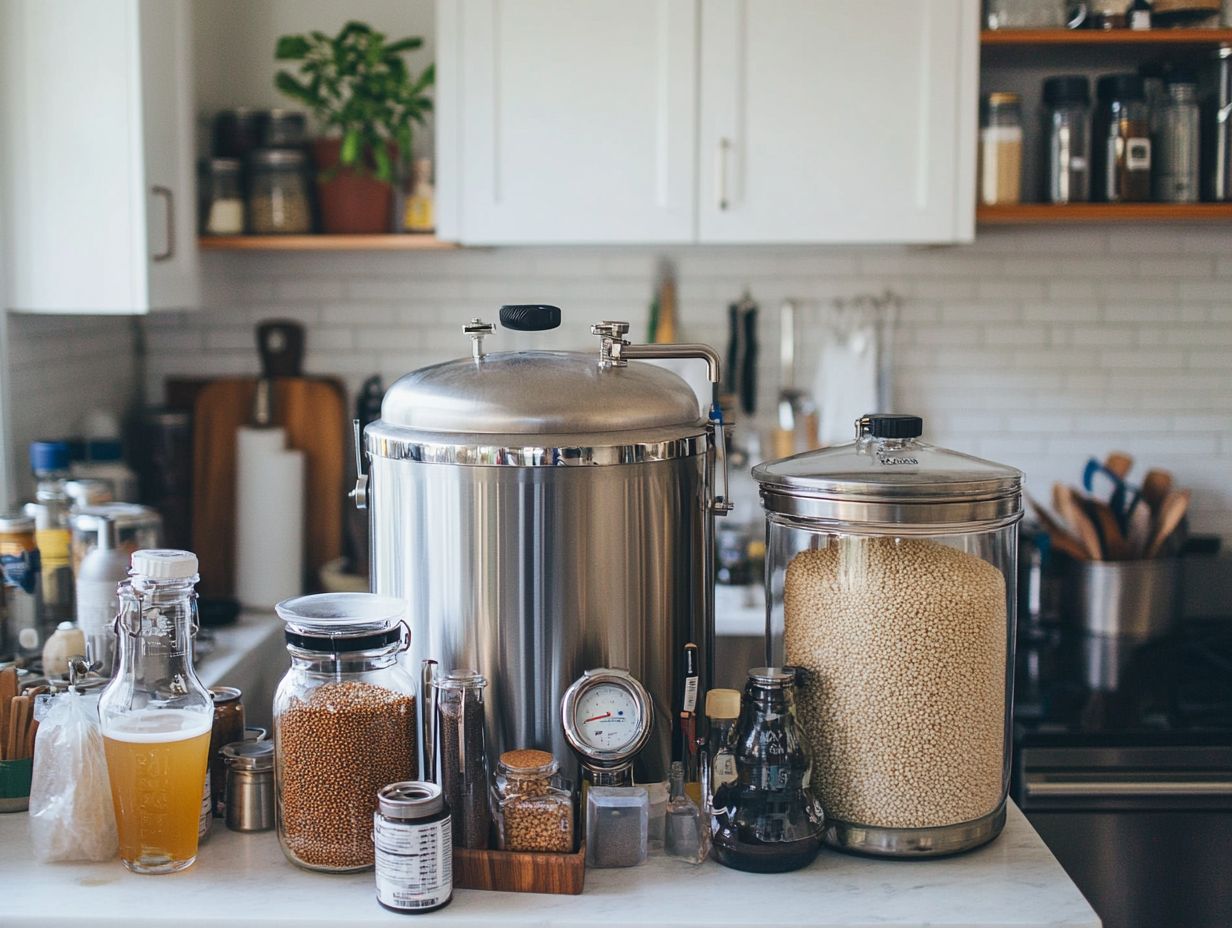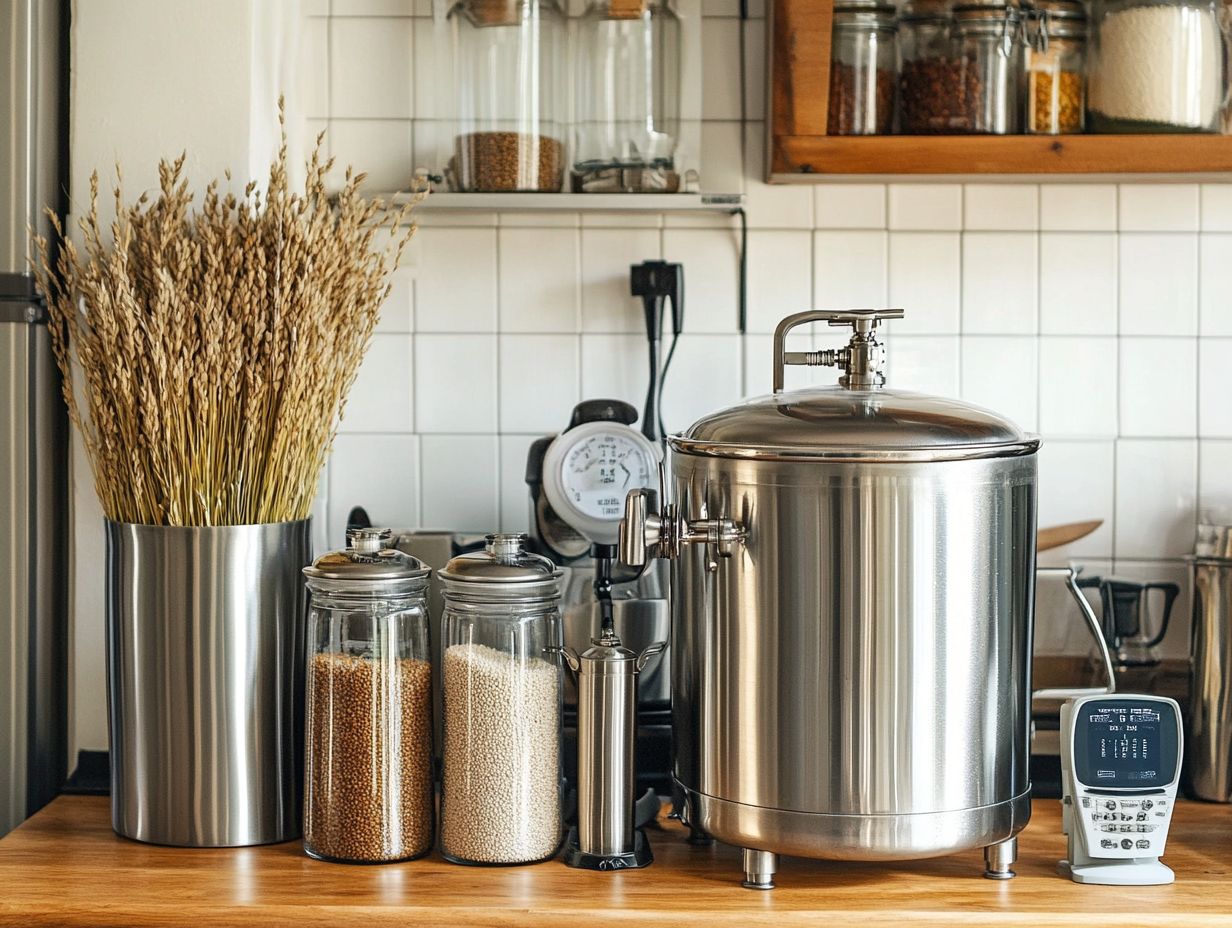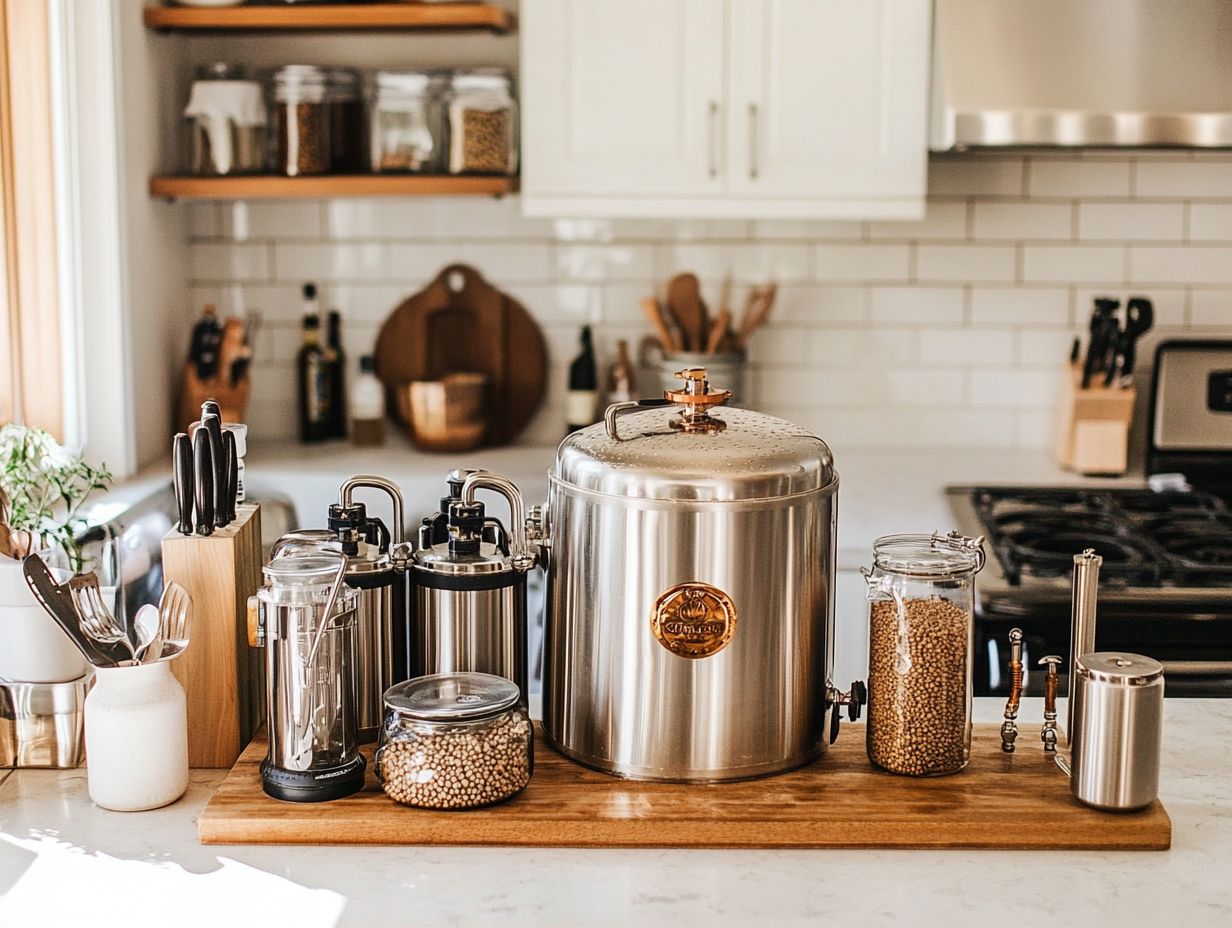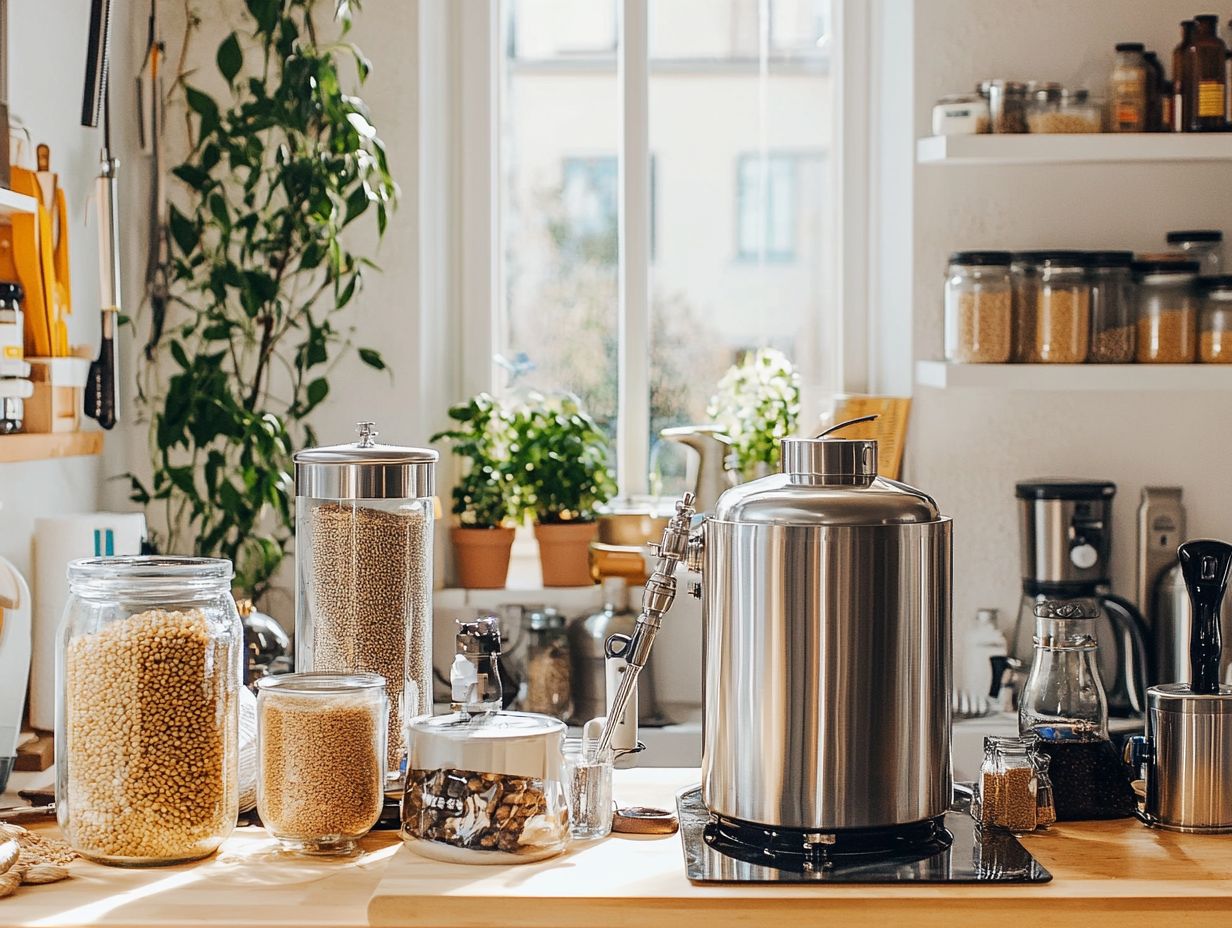How Do I Brew Gluten-Free Beer?
Brewing gluten-free beer presents a delightful alternative for individuals with celiac disease, gluten intolerance, or those who simply prefer gluten-free options.
This article delves into the motivations for brewing gluten-free beer, the distinctive ingredients that characterize it, the brewing process, and key tips for ensuring successful home brewing.
Whether you re a seasoned brewer or a curious newcomer, you ll uncover the secrets to crafting your own gluten-free brew that everyone can relish.
Contents
- Key Takeaways:
- Why Would Someone Want to Brew Gluten-Free Beer?
- What Ingredients Are Used in Gluten-Free Beer?
- 4. Additional Flavorings
- How Is Gluten-Free Beer Brewed?
- 1. Choosing the Right Gluten-Free Grains
- 2. Milling and Mashing Gluten-Free Grains
- What Are Some Tips for Brewing Gluten-Free Beer?
- Frequently Asked Questions about Gluten-Free Brewing
- Brewing Gluten-Free Beer: Time and Techniques
Key Takeaways:

- To brew gluten-free beer, it’s important to consider the reasons why someone might want to drink it, such as having celiac disease or a gluten intolerance, or simply a personal preference.
- Gluten-free beer can be made using alternative ingredients such as sorghum, millet, and rice, instead of traditional grains like barley and wheat. Hops and yeast also play a crucial role in the brewing process.
- The brewing process for gluten-free beer involves selecting the right grains, milling and mashing them, boiling and adding hops, and fermenting and conditioning the beer. It’s important to use gluten-free equipment and be aware of cross-contamination during the process. Experimenting with different grains and flavors can also result in unique and delicious gluten-free beers.
Why Would Someone Want to Brew Gluten-Free Beer?
Brewing gluten-free beer is gaining momentum for a multitude of reasons, particularly among those grappling with celiac disease or gluten intolerance. For these individuals, adhering to a gluten-free diet is not just a preference but a necessity to avoid unpleasant health repercussions.
According to the Cleveland Clinic, gluten sensitivity can incite autoimmune responses, underscoring the importance of discovering gluten-free alternatives to traditional beer. This burgeoning interest also resonates with those who choose gluten-free options for their personal health, highlighting the vibrant community of gluten-free beer lovers and home brewers that continues to flourish.
1. Celiac Disease or Gluten Intolerance
Celiac disease is an autoimmune disorder that significantly impacts individuals who consume gluten, leading to a range of health symptoms that can be quite debilitating.
You may find that these symptoms often manifest as gastrointestinal issues like bloating, diarrhea, and abdominal pain. However, they don t stop there. Non-digestive symptoms such as fatigue, anemia, and joint pain can also make their unwelcome appearance. If you re experiencing these signs, diagnosing the condition typically involves a combination of blood tests and sometimes, a biopsy a procedure where a small piece of tissue is taken for examination of the small intestine to confirm any damage.
Living with celiac disease or gluten intolerance profoundly affects your quality of life. Even slight exposure to gluten can trigger severe reactions. To manage this lifestyle, many individuals seek out gluten-free alternatives, like gluten-free beer, which provides a safe and enjoyable option for social gatherings without the risks associated with gluten consumption.
2. Personal Preference
You may find that brewing gluten-free beer is a choice not just rooted in health concerns, but also in personal preferences that resonate with a gluten-free lifestyle.
This decision often arises from various motivations, such as the necessity to avoid gluten due to celiac disease or gluten sensitivities, which affect millions globally. You might discover that gluten-free options provide a digestive advantage, contributing to your overall wellness. Alternatively, the allure of gluten-free beer could stem from a desire to explore unique flavor profiles and innovative ingredients that break away from traditional brewing methods.
Ethical considerations also play a significant role in this choice. Supporting gluten-free agriculture and sustainable practices can enhance the appeal of these beverages, as you seek alternatives that align with your values and dietary choices.
Imagine sharing a refreshing gluten-free brew with friends at your next gathering, knowing it s just as delicious as traditional beer!
What Ingredients Are Used in Gluten-Free Beer?
Dive into the exciting world of gluten-free brewing and discover flavors that will tantalize your taste buds! Crafting gluten-free beer demands a distinctive blend of ingredients specifically designed to exclude gluten, commonly found in traditional brewing grains such as barley and wheat. Instead, brewers often choose gluten-free alternatives like sorghum, buckwheat, millet, and rice, skillfully combined with essential components like hops and yeast to foster a rich fermentation process.
These alternative grains not only cater to dietary needs for those with gluten sensitivities but also add to the unique flavor profile that sets gluten-free beer apart from its conventional counterparts.
1. Essential Grains for Gluten-Free Beer
Choosing the right gluten-free grains is essential in brewing gluten-free beer, as these grains serve as the primary fermentable ingredients that provide the necessary sugars for fermentation.
Understanding the properties of grains like sorghum, millet, buckwheat, and rice can influence the final product. For example, sorghum is renowned for its mild sweetness and rich, malty character, creating a delightful base for various beer styles.
Millet offers a more delicate, earthy flavor that enhances the profile of lighter ales and lagers. Though technically a seed, buckwheat contributes a nutty aroma and complexity that beautifully complements robust recipes, adding depth and character to your brew.
Rice, with its ability to lighten the body and impart crispness, is an excellent choice for refreshing, clean-tasting beers. Each of these grains not only impacts flavor and aroma but also plays a crucial role in mouthfeel, allowing you to explore a diverse array of gluten-free beer experiences.
2. Hops

Hops are absolutely vital in the art of brewing gluten-free beer, contributing essential bitterness, flavor, and aroma that beautifully balance the sweetness of sugars that can turn into alcohol derived from gluten-free grains.
As a brewer, you ll find that various hop varieties allow you to craft your desired flavor profile and aromatic experience. Take Cascade hops, for instance; they impart a delightful citrusy and floral character, while Saaz hops lend an earthy, spicy note that can elevate your brew.
The timing of your hop additions during the brewing process can dramatically influence the final product. Adding hops early in the boil enhances bitterness, while later additions are key to preserving those aromatic qualities that make your beer sing.
Don’t miss out on dry hopping! This technique involves introducing hops after fermentation, which can elevate the sensory experience with vibrant aromas without overwhelming bitterness. This approach showcases the delicate balance and complexity that hops contribute to gluten-free beers, allowing you to create something truly special.
3. Yeast
Yeast plays an essential role in brewing gluten-free beer, acting as the catalyst that converts sugars into alcohol and carbon dioxide during fermentation.
Selecting the right strain of yeast can dramatically impact the taste and aroma of your final product, making it vital for you to grasp the nuanced characteristics of various yeasts. For gluten-free brewing, you might consider options like S. cerevisiae or different wild yeasts, each offering its own unique flavors and fermentation rates.
Maintaining healthy yeast cells is paramount, as they efficiently metabolize sugars and enhance the complexity of your beer’s flavor profile, imparting delightful fruity or spicy notes based on the strain you choose. Effective fermentation management, including temperature control and nutrient availability, helps yeast flourish, ultimately leading to a more expressive and enjoyable beer experience.
4. Additional Flavorings
To elevate the flavor and distinctiveness of gluten-free beer, brewers often enhance their creations with a variety of flavorings, including spices, fruits, and herbs. These additions collectively enrich the overall sensory experience.
The selection of these flavorings plays a pivotal role in shaping both the aroma and taste profile of the beer. Imagine the bright citrus notes bursting forth from fresh fruits like oranges and lemons, contrasted with the warm, earthy undertones brought forth by aromatic spices such as cinnamon or coriander.
Techniques like adding fruit extracts during fermentation can amplify sweetness and complexity. Additionally, introducing herbs during the boil offers a more subtle infusion of flavor.
Adding hops after brewing can infuse a freshness and aroma that is particularly delightful in summer ales! It s essential to understand the timing of these additions. For example, spices are typically introduced in the last few minutes of the boil to preserve their vibrant characteristics. Fruits may be added post-fermentation for a seamless integration into the final product.
How Is Gluten-Free Beer Brewed?
Brewing gluten-free beer is an art that demands a unique process, complete with specialized techniques and equipment to guarantee safety and quality for individuals with gluten sensitivities or allergies.
From the careful selection of gluten-free grains to the meticulous management of the fermentation process, each step is vital in crafting a gluten-free beer that is both delightful and safe to enjoy.
If you’re venturing into gluten-free home brewing, grasping the intricacies of the entire brewing system and process will elevate your experience and pave the way for consistently exceptional results.
1. Choosing the Right Gluten-Free Grains
The journey to crafting gluten-free beer begins with selecting the right gluten-free grains, which will lay the groundwork for both flavor and fermentation. Alternative grains like buckwheat and quinoa can also be excellent choices.
Choosing the appropriate grains is crucial as they profoundly influence the final product’s taste and aroma. Explore your options based on their unique qualities:
- Sorghum: A popular choice for gluten-free brewing, offering a mildly sweet flavor and contributing a satisfying body and mouthfeel.
- Rice: With its neutral taste, it allows other ingredients to shine while lending a lighter finish to your brew.
- Millet: Introduces delightful nutty undertones, enhancing the complexity of the beer.
Don’t overlook availability; some grains may be more accessible than others, impacting your choices. Additionally, assess how well these grains pair with other adjuncts like hops and yeast to ensure a harmonious blend that complements the desired style of your gluten-free beer.
Next, let’s explore the milling and mashing processes!
2. Milling and Mashing Gluten-Free Grains
Milling and mashing are essential stages in your gluten-free beer brewing journey, crucial for extracting those fermentable sugars from your chosen gluten-free grains. Properly milling these alternative grains is key to successful mashing.
During the milling process, pay attention to the consistency of the grain size. Achieving a uniform crush is vital for enhancing the efficiency of the mashing phase. Using a roller mill is highly recommended to achieve the perfect crush without generating too much heat.
Once you’re done milling, it’s time to enter the mashing phase. Here, you’ll mix the crushed grains with hot water, ideally in the range of 150-160 F. This temperature allows the enzymes to work their magic, breaking down starches into sugars!
Maintaining this temperature for about 60 minutes is critical to maximize sugar extraction and elevate flavor profiles. Investing in the right equipment, such as a mash tun with precise temperature control, will significantly impact your results.
This attention to detail ensures that your final product not only embodies quality but also resonates with gluten-free beer enthusiasts who appreciate authenticity.
3. Boiling and Adding Hops for Gluten-Free Beer

The boiling stage is essential when brewing gluten-free beer. It serves to sterilize the wort, which is the liquid extracted from the mash during the brewing process, while introducing hops that enhance the beer’s flavor and aroma.
This process not only eradicates any unwanted bacteria but also concentrates the flavors of the malt and other ingredients. Elevating your brewing game is the goal here.
Timing is everything when it comes to adding hops during the boil. Early hop additions, typically introduced at the beginning of the process, bring bitterness that balances the sweetness of the gluten-free malt.
On the other hand, adding hops in the last 15 minutes focuses on aromatic qualities. This imparts delightful floral and citrus notes that elevate your brew’s sensory profile.
Each hop addition significantly impacts the final beer’s bitterness, flavor complexities, and aromatic depth. All of these are vital for crafting a well-rounded and satisfying gluten-free beer.
Master this stage to create a standout gluten-free beer that everyone will rave about!
4. Fermentation and Conditioning Gluten-Free Beer
Fermentation and conditioning are pivotal stages in your journey of brewing gluten-free beer. During this phase, yeast diligently transforms sugars into alcohol under carefully controlled conditions.
You’ll need to manage the temperature with precision, typically between 60 F and 75 F. This ensures optimal yeast activity while preventing any unwanted flavors from sneaking in.
Fermentation can take anywhere from five days to several weeks, depending on your desired beer profile.
During this period, the yeast is hard at work, converting fermentable sugars derived from gluten-free grains like sorghum or millet.
Once fermentation wraps up, conditioning becomes essential in developing richer flavors and enhancing carbonation.
This process allows your beer to mature, achieving a nuanced balance that will delight even the most discerning palates. Ultimately, this elevates your overall drinking experience.
What Are Some Tips for Brewing Gluten-Free Beer?
When you embark on the journey of brewing gluten-free beer, several tips can elevate your experience. This ensures both success and safety particularly if you have gluten sensitivity or celiac disease.
It’s essential to invest in gluten-free brewing equipment and maintain a vigilant stance against cross-contamination to preserve the integrity of your brew.
Consulting with an allergist can help ensure your brewing environment remains safe for those with severe gluten sensitivity or gluten intolerance.
As a home brewer, feel free to experiment with various grains and flavors. Allow your creativity to flourish as you craft the perfect taste and style that suits your palate.
Many in the gluten-free community find joy in discovering new recipes and sharing their creations.
1. Use Gluten-Free Equipment
Utilizing gluten-free equipment is essential for brewers like you. This prevents cross-contamination and ensures that your final product is safe for individuals with gluten sensitivities.
By using dedicated gluten-free brewing equipment, you create a controlled environment. This significantly reduces the risk of cross-contact with gluten-containing ingredients.
It’s important that essential tools such as fermentation tanks, brewing kettles, and bottling lines are exclusively designated for gluten-free processes.
To uphold best practices in sanitization, make it a point to thoroughly clean all equipment with gluten-free compliant cleaners. Adhere to a strict cleaning schedule.
Maintaining a segregated workspace and using separate utensils will further safeguard against any potential adverse reactions.
Regularly inspecting and labeling all your equipment is crucial to ensure it remains gluten-free. Moreover, educating your staff about the risks of cross-contamination is instrumental in preserving the integrity of the brewing process, as recommended by experts in gluten-free brewing practices.
So roll up your sleeves and start brewing your unique gluten-free beer today!
2. Be Aware of Cross-Contamination in Gluten-Free Brewing
Being aware of cross-contamination is crucial when brewing gluten-free beer, as even the slightest trace of gluten can pose serious health risks for individuals with celiac disease or gluten intolerance.
This reality makes it essential for you, as a brewer, to adopt rigorous safety practices throughout the brewing process. Properly cleaning your equipment before and after use is of utmost importance, as any residual gluten from previous batches can unknowingly contaminate your gluten-free products.
Adopting strict protocols for ingredient handling is equally vital; utilizing dedicated tools and storage areas can greatly reduce the risk of gluten exposure. Additionally, ensuring that your staff is well-trained in these protocols will keep everyone on their toes.
By prioritizing these safety measures, you not only protect the health of your consumers but also maintain the integrity of your gluten-free brewing practices. This is especially important for those with autoimmune conditions like celiac disease.
3. Experiment with Different Gluten-Free Grains and Ingredients
As a home brewer, you re encouraged to dive into the world of gluten-free grains and ingredients, crafting unique flavors and styles in your gluten-free beer.
By stepping beyond traditional options, you can explore a diverse array of grains like millet, sorghum, or rice. Not only do these choices cater to dietary needs, but they also unlock a treasure trove of exciting flavor profiles. Experimenting with various hops can take your brewing to the next level, adding aromatic and bitter notes that beautifully complement your base ingredients.
Don t shy away from unconventional flavorings like fruit, spices, or herbs; they allow you to create standout brews that truly tantalize the palate. This playful approach to brewing enhances the drinker s experience while sparking your creativity, inspiring you to share your innovative concoctions with the gluten-free community.
In this way, each batch you produce becomes a delightful journey of discovery, both for you as the brewer and for those who savor your creations. Sharing these creations with the gluten-free community fosters a sense of camaraderie and support.
Frequently Asked Questions about Gluten-Free Brewing
How Do I Brew Gluten-Free Beer?
Brewing gluten-free beer may sound intimidating, but with the right ingredients and process, it can be just as tasty as traditional beer. Here’s how to get started.
What ingredients do I need to brew gluten-free beer at home?
The key to brewing gluten-free beer is using ingredients that are naturally gluten-free, such as sorghum, rice, buckwheat, and quinoa. You will also need yeast, hops, and water. Consider using Clarity Ferm to reduce any residual gluten and ensure your beer is safe for those with celiac disease or gluten intolerance.
Can I use regular brewing equipment to make gluten-free beer at home?
Yes, you can use your regular brewing equipment to make gluten-free beer. Just make sure to thoroughly clean and sanitize your equipment to avoid any cross-contamination with gluten-containing ingredients. Investing in dedicated gluten-free brewing equipment could be a safer option for those with severe gluten sensitivity.
What are the steps for making gluten-free beer at home?
The steps for making gluten-free beer are similar to traditional beer brewing. You will need to mash your grains, boil your wort, add hops, cool the wort, and ferment with yeast. The main difference is using alternative grains like sorghum, buckwheat, millet, or rice instead of barley or wheat. It’s essential to use ingredients that fit a gluten-free diet, especially for those with celiac disease or gluten intolerance.
How do I ensure my gluten-free beer is free of gluten and meets safety standards?
To ensure your beer is truly gluten-free, it’s important to use ingredients that are certified gluten-free and to carefully follow the brewing process. You can also use products like Clarity Ferm during the fermentation process to reduce gluten levels. Additionally, having your finished beer tested for gluten levels can give you peace of mind. Consult with an allergist if you have severe gluten sensitivity or celiac disease to understand the best practices for your brewing system.
Brewing Gluten-Free Beer: Time and Techniques
How long does it take to brew gluten-free beer and what brewing techniques can I use?
Brewing gluten-free beer is a rewarding adventure! The process can take anywhere from 3 to 6 weeks, depending on your recipe and fermentation time.
It’s crucial to allow enough time for fermentation and carbonation to achieve the best taste. Homebrewers often face unique challenges when brewing gluten-free.
Community resources, like the Gluten Free Home Brewing supply store in Northern California, provide valuable tips and equipment. Using clean and safe brewing techniques will ensure a quality product.







